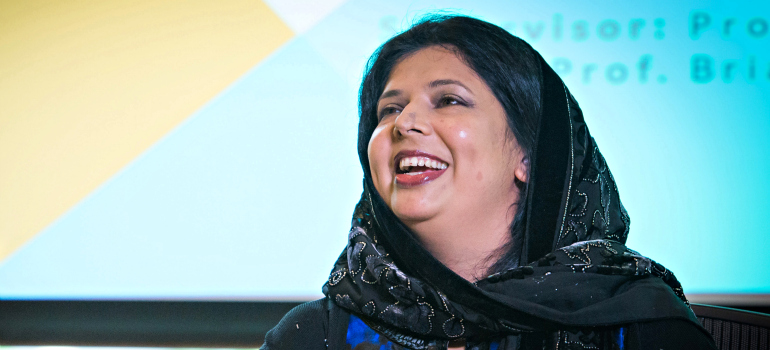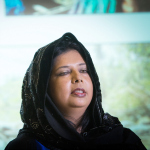Rumana Monzur has overcome a violent domestic attack and the loss of sight to get her Master’s degree
Two years after surviving a domestic attack that shocked the world, Rumana Monzur refuses to let go of her dreams.
The University of British Columbia student was blinded in a brutal attack by her former husband while visiting Bangladesh in June 2011. After a painful adjustment to life without sight, Monzur is getting her life back on track, and will not be defined by violence.
This month marks two major milestones in Monzur’s recovery: The successful defence of her Master’s thesis, and acceptance to law school at UBC, which she hopes will enable her to help other victims of violence find justice.
“If you told me I’d be finishing my Masters and entering law two years ago, I would have just laughed – or maybe just cried,” says Monzur, who lives on UBC’s Vancouver campus. “Lying in the hospital, it just felt like my dreams were over. The idea of finishing this program just seemed impossible.”
Monzur defended her Master’s thesis – on the risks climate change poses to Bangladesh – in front of a small collection of family, friends and faculty on June 28. When administrators from UBC’s Political Science department announced her successful defence, cheering, laughter and tears rang out, marking the end of the darkest period of her life.
“What Rumana has done is a tremendously exceptional achievement,” says Monzur’s graduate program supervisor, UBC Political Science Assoc. Prof. Lisa Sundstrom. “As someone who has lived sighted her entire life, and has been able to write and defend her Master’s thesis as quickly as she has – while still adjusting to blindness – that’s just remarkable.”
Monzur hopes her thesis inspires action. “Flooding, cyclones, rising sea levels – are just some of the climate issues facing Bangladesh, each with the potential to be catastrophic for my people,” she says. “The government still has no plan for addressing the problem of rising sea levels, which is one of the things I outline in my thesis – it is crucial that policy makers start planning for this.”
Friends rally to her aid
Monzur says her thesis would have been impossible without friends and her strong Muslim faith. At UBC’s Crane Library, friends and volunteers took turns recording themselves reading Monzur’s textbooks, plus course materials for other visually impaired students. Others helped with typing, editing and formatting the ideas Monzur dictated, and helped with her audio-visual presentation.

Monzur credits her friends and family for supporting her as she adjusted to a new life. Photo: Martin Dee
It was her friends from UBC’s Saint John’s College – where Monzur lived in residence – who mobilized the campus two years ago when she was in trouble. “We first learned something bad happened on Facebook,” says Sarah Meli. “There were all these posts from friends in Bangladesh, saying ‘get better’ and ‘thinking of you,’ and we got worried.”
So Monzur’s friends contacted her relatives in Bangladesh. “They said there was an accident and Rumana’s eyes have been damaged,” says Sotonye Godwin-A. Hart, who alerted the university administration, setting off a dramatic effort involving dozens of university units, including the President’s office.
“Our priorities were Rumana’s safety and securing medical care for her,” Sundstrom says. When doctors in India and Bangladesh said nothing could be done, friends and university staff worked tirelessly to make arrangements for Monzur to fly back to Vancouver for emergency treatment by eye specialists.
“We were racing against the clock,” Sundstrom says. “The chances of getting her sight back were getting smaller every moment that passed.” Staff met Monzur at the Vancouver airport and drove straight to the hospital. In total, she underwent four medical procedures on her eyes over the next days – all failing to restore her sight – plus reconstructive surgery on her nose, which had been partially bitten off in the attack.
Faculty and staff then arranged flights and housing for Monzur’s daughter and parents to join her in Vancouver.
Global support
As the drama unfolded, a grassroots campaign led by UBC students and faculty members galvanized support. Public rallies in Vancouver, Toronto and Bangladesh drew attention to Monzur’s plight – as did news media. Donations flooded in from around the world – $95,000 in total – for medical and living expenses. UBC President Stephen Toope denounced the violence and called on the community to help.
“I just feel so blessed for the amazing support I have received,” says Monzur, who was accepted to several law schools. “I wanted to list everyone who helped me in my thesis acknowledgements, but it would have been longer than my actual thesis. When my friends told me what people were doing, I just cried. I felt so proud of UBC. I will never forget every person who helped me.”
Acrobatic yoga
Monzur, who is learning braille and uses computer software for the visually impaired, says the hardest part of accepting blindness is never seeing loved ones again, especially her daughter Anusheh, a six-year-old chatterbox.
“Definitely, that’s the hardest part – so many people have helped me, and I don’t even know what they look like,” she says. “Sometimes it’s torture not seeing my daughter. I use my other senses – hugging her, smelling the way her hair smells, listening to her breathing – but knowing that I’ll never see her grow is hard.”
Monzur prefers to focus on new challenges, which have been crucial for getting her confidence back. Recently she enrolled in acrobatic yoga, a challenging test of balance, flexibility and strength that is performed in pairs. With a partner serving as the base, Monzur acts as the flyer, her feet often leaving the ground.
“My friends dared me to try it – and I just love the feeling,” says Monzur. “It helps me with my balance and strength, and fills me with positive energy. It is the only thing I’ve ever done that actually makes me forget that I can’t see.”
New chapter begins: Law school
The next chapter of Monzur’s life will begin in September, when she enters UBC’s Faculty of Law at Allard Hall. She says her experience with domestic abuse and the legal system in Bangladesh were major factors in her decision to pursue law.
“I want to be a voice for marginalized women who are facing violence,” says Monzur. Several days passed after her attack – marked by streets protests in Bangladesh and growing international outcry – before police took her former husband into custody.
“Given my experience with the legal system, I can only imagine how difficult it is for others,” she says. “I want to be a voice for those people, to help them find justice.”

